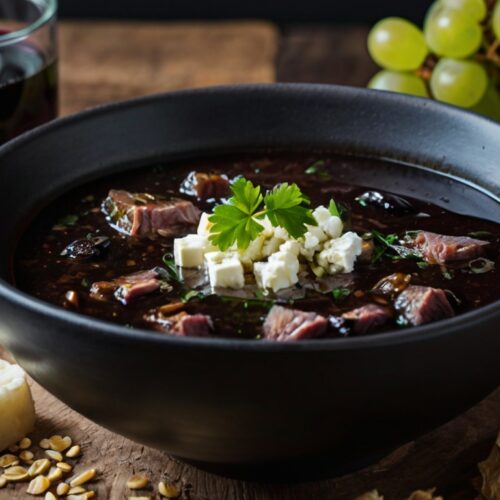Few dishes in history embody the spirit of an entire culture quite like Melas Zomos, the Spartan Black Broth. This simple yet infamous dish was a staple of Spartan society, reflecting the austerity, discipline, and resilience that defined one of the most formidable warrior cultures in ancient Greece.
Melas Zomos, made with pork, blood, vinegar, and spices, may not sound appealing to modern palates, but it played an essential role in the Spartan diet and was a key element in the communal eating rituals that fostered unity and strength among their warriors.
Today, we delve into the origins of this legendary dish, its role in Spartan society, and its legendary status in the annals of history.
Origins: Plutarch and Historical Accounts
Our knowledge of Melas Zomos comes largely from the writings of Plutarch, a Greek historian and biographer who documented much of what we know about Spartan culture. The dish appears in his work of The Life of Lycurgus.
Plutarch described Zomos as the primary meal for Spartan warriors, a dish designed not for luxury but for sustenance and strength.
He recounted stories of visitors to Sparta who found the taste of this dish unbearable, with one famous anecdote involving a wealthy Sybarite who tasted Melas Zomos and remarked that it explained why Spartans had no fear of death—they preferred anything over eating the broth again.
Melas Zomos in Spartan Society
In Spartan society, Melas Zomos was more than just food; it was part of their way of life, a representation of the communal and disciplined nature that defined Spartan identity. Spartans would dine together in syssitia (communal mess halls), where warriors shared simple meals that reinforced equality and brotherhood.
Melas Zomos was the centerpiece of these gatherings, embodying the collective spirit of Sparta—equality, resilience, and the rejection of luxury.
Eating the black broth was a reminder of the values that Spartans held dear, and it was thought to help toughen the warriors, conditioning them to withstand hardship in all its forms.
The Simplicity of the Dish
Unlike the elaborate feasts enjoyed in other Greek city-states, Spartan cuisine was stark and austere, reflecting their disdain for indulgence.
Melas Zomos is the ultimate symbol of this simplicity—made with pork, blood, vinegar, salt, and a few other ingredients, it was a practical and utilitarian dish designed to provide nutrition without any frills.
The use of blood and vinegar not only enhanced the nutritional value but also prevented spoilage, making it a practical choice for a society that valued utility over taste.
Legends and Stories of Melas Zomos
The stark contrast between Spartan meals and the cuisine of other Greek city-states led to several legends and anecdotes about Melas Zomos.
One well-known story comes from Plutarch, who noted that a visitor from Sybaris (a city known for its luxurious lifestyle) tried Melas Zomos and found it revolting, leading him to joke that death would be preferable to eating the broth again. This anecdote highlights the extreme austerity of Spartan food compared to the more refined culinary traditions of other Greek states.
Another story involves Spartan cooks, who were reputed for their expertise in preparing Melas Zomos. According to Critias, when asked about the secret to making Melas Zomos palatable, a Spartan cook famously replied that it wasn’t just the recipe but the lifestyle of the Spartans that made the dish acceptable.
This story emphasizes that the broth was not just about nourishment—it was about embracing the Spartan ethos of endurance, equality, and resilience.
Spartan Black Broth Recipe:
Now, let’s recreate Melas Zomos, the Spartan Black Broth, in your own kitchen. While it may not be to everyone’s taste, it offers a unique opportunity to experience the culinary history of ancient Sparta.
If you’re enjoying my work consider buying me a coffee :).

Spartan Black Broth (Melas Zomos)
Ingredients
- 1 lb pork shank
- 1/2 pint pork blood
- 1/2 cup vinegar we used grape vinegar
- 1 Tbsp olive oil
- 1/2 tsp salt
- 2 bay leaves
- 1 onion chopped
- Barley optional
Instructions
- Prepare the Base: Set a large stock pot over medium heat. Add the olive oil and onions, and cook until tender and lightly browned, about 10 minutes. If using barley, add it with the onions and toast it lightly.
- Sear the Pork: Add the chopped pork shank to the pot and cook for another 10 minutes. Searing the meat carefully will add a good amount of flavor to the dish, but try not to burn the fond on the bottom of the pot, as it will add a burnt flavor to your soup.
- Deglaze and Simmer: Deglaze the pot with the vinegar, then add about 3-4 cups of water, the bay leaves, and the salt. Once the mixture is boiling, lower the heat to medium-low and simmer, covered, for about 45 minutes to an hour (the longer, the better).
- Add the Blood: When the pork is cooked through and tender, add the pork blood, and allow it to simmer for about 10-15 minutes more while stirring constantly. If the soup begins to thicken too much, you can add a little more water to reach the desired consistency.
- Serve: Adjust the final flavor to your liking and serve warm. Zomos is best enjoyed with simple accompaniments like bread or a side of greens, reflecting the Spartan commitment to simplicity.
Video
Notes
- Blood Subsitute: If you don’t have or want to use Pig’s Blood, feel free to swap with the same portion of either Beef Broth or Red Wine.
- Searing the Pork: Take care not to burn the pork or onions when searing, as burnt flavors can overpower the dish’s simple, earthy taste.
- Adjusting Flavor: The vinegar adds sharpness to the broth; feel free to adjust the amount to suit your taste, especially if you prefer a milder acidity.